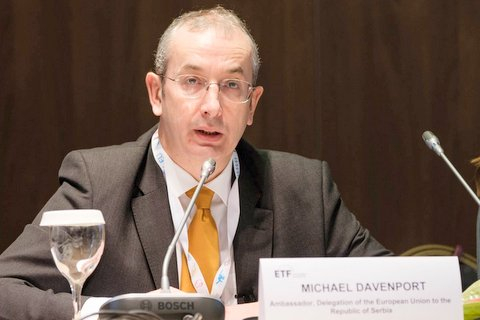
EU Ambassador Praises ETF for supporting skills development
Michael Davenport, head of the EU Delegation in Serbia, says a holistic approach to economic growth and employment sustainability is essential.
The role of skills development and improving human capital capacity as key factors in helping drive Europe's economic development, sustainable growth and enhanced, long-term employment prospects cannot be underestimated, he said, addressing the ETF's Torino Process 2016-17 Regional Forum in Belgrade.
‘It is very important for us all to take stock of the progress made in the reforms of vocational education and training, both more widely across Europe and beyond but also from a regional perspective. This is a good opportunity to identify what are common trends, best practices and to learn from one another.’
Anticipating likely future needs and the specific challenges individual countries in a region that includes five EU accession candidates - Albania, the Former Yugoslav Republic of Macedonia, Montenegro, Serbia and Turkey - was essential.
‘The picture on growth around the region is diverse,’ Mr Davenport said. ‘When you look at the prospects for growth, one of the main drivers of that growth is always going to be human capital, its state and dynamics.
'The development of links between education and the needs of the labour market and business and the improvement of labour force skills is one of the key factors in ensuring that prospects for economic recovery are maxmised.’
There were signs across the region this message was being taken seriously, he said, pointing to the recent introduction of new laws in Serbia that improve labour market flexibilty and free up investment.
As a result, he added, ‘we are seeing unemployment coming down.’ Effective and targeted skills development was necessary to prevent shortages in economically significant areas.
He added that in Serbia alone, the EU had invested €25 million over the last 15 years to support the modernisation of VET curricula, update teaching methods and re-equip schools ‘to provide students with the tools to help them acquire the right skills from the outset.’
‘In today's more knowledge-based economy, the demand for skills needs to be seen in the same bracket as the supply of skills,’ Mr Davenport stressed. It is not just the responsibility of government: there needs to be joint cooperation between the private and public sectors to ensure everything is done to mitigate skills shortages and that education and training systems are as responsive and flexible as possible to the needs of business and the labour market.’
Thanking the ETF for bringing regional stakeholders together in Belgrade, he added: ‘this is very much where the ETF comes in....through the already well-established Torino Process, the ETF is helping countries ensure the analysis of relevant results, economic indicators, the effectiveness of policy responses taken, is done in a way that is all encompassing and that brings together all the major actors - public and private sector - in a comprehensive approach to this cross cutting issue.’
Delegates at the conference outlined some of the key areas of progress made during the current round of the Torino Process - the ETF's tool for evidence-based information collection and analysis in the reform of vocational education and training systems. These ranged from the National Skills and Employment Strategy 2020 introduced in Albania in 2014, to the adoption in December 2016 by Turkey's Grand National Assembly of changes to the law on Work Based Learning.
Did you like this article? If you would like to be notified when new content like this is published, subscribe to receive our email alerts.